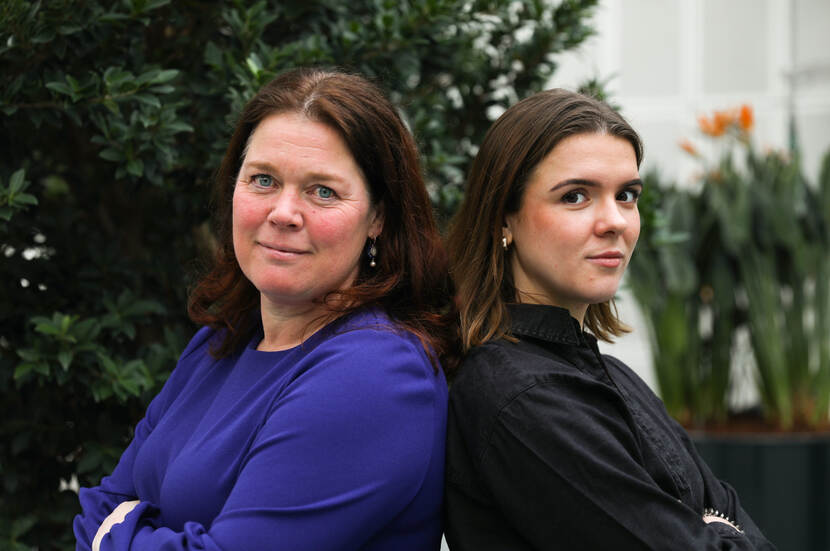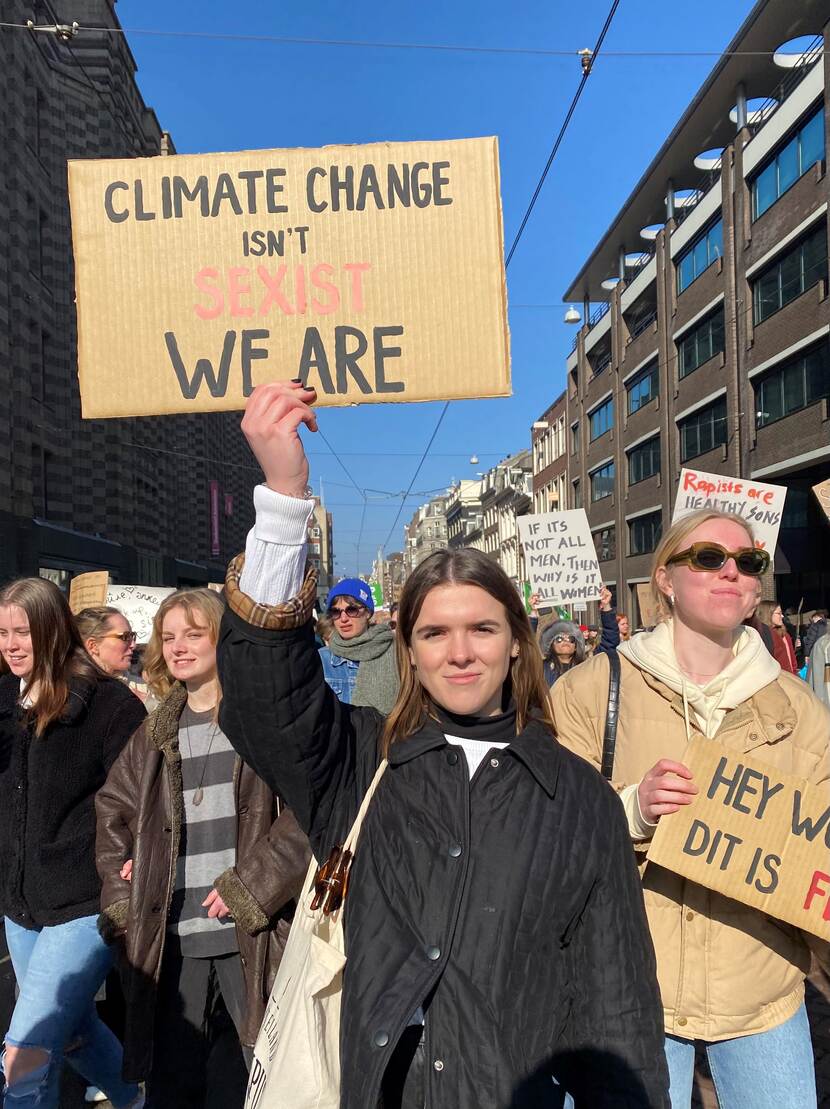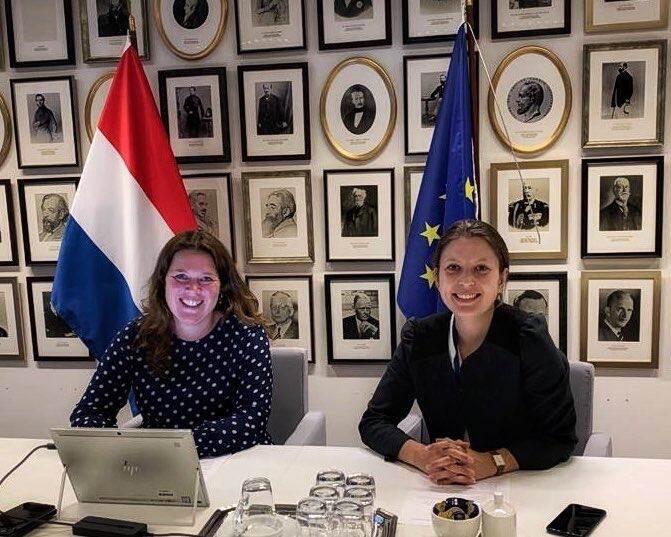Gender equality for a sustainable future
On International Women’s Day 2022 Pascalle Grotenhuis, Ambassador for Gender Equality and Women’s Rights, and Aniek Moonen, chair of the Youth Climate Movement, talk about the strengths of women and young people in the face of the climate crisis. ‘The fact that women and young people are being hit hard by climate change means they have very creative ideas,’ says Pascalle.

‘The world’s population is half men and half women, but you don’t really see that 50/50 ratio reflected anywhere,’ Pascalle points out. There were few women leaders at COP26 in Glasgow, for example, and only 25% of EU member states’ climate and environment ministers are women. Based at the Ministry of Foreign Affairs, Pascalle promotes women’s rights and gender equality all over the world. ‘We draw attention to women’s rights globally, support projects designed to foster gender equality, and help women leaders and organisations that have no resources or no place at the table.’
But Pascalle says it’s about more than women: young people and indigenous women are not represented at all. As chair of the Youth Climate Movement, Aniek has also found that young people’s input is often disregarded, while they can in fact offer a useful long-term perspective. ‘I might live until 2080, or even 2100, so I really do make different decisions from someone who knows they won’t be around after 2040,’ she says.
Hard hit
‘All crises actually hit women and girls hardest,’ says Pascalle. ‘In a climate crisis, women often have extra work caring for their family or elderly relatives. When schools and healthcare institutions close, women have barely any access to services like contraception and maternal care, even though it is important for young women to able to decide for themselves when they have children, how many and with whom.’

‘Often it’s young women who are the first to lose their jobs,’ Aniek adds, while climate change will in the future affect all young people. Aniek believes there is too little discussion of the fact that some groups are disproportionately affected by climate change. ‘Climate change is not only about tonnes of carbon emitted and hotter summers. There are many factors that impact climate change, and lots of ways that the change manifests itself. So there isn’t a single cause or a single consequence, and there’s also no single solution.’
Clean cooking and car sharing
Aniek and Pascalle think that lots of solutions exist within groups that currently tend to be underrepresented in the climate debate. ‘The fact that women and young people are being hit hard by climate change means they have very creative ideas,’ says Pascalle. ‘Such as the clean cooking initiatives that promote healthy and environmentally-friendly ways of cooking, with ethanol stoves, for example, rather than using charcoal or petroleum. This makes a real difference to women living in difficult circumstances.’
Pascalle also finds that younger people are often more freethinking, that their vision is not clouded by vested interests. Aniek agrees. ‘We see that the people who are pulling the levers now often think within a certain bandwidth: how can we solve the climate problem while maintaining our standard of living?’ But this is not an option, she believes. ‘We are really going to have to make sacrifices, because our current way of life is not sustainable. Young people are often aware of this and so come up with creative solutions.’
Pascalle mentions the example of car sharing. ‘Young people reason that not everyone needs two cars, as you can also borrow a car.’ Aniek nods in agreement. ‘Young people are more flexible that way, thinking “if I don’t buy a car, how can I deal with that?”’ Aniek feels that the power of this kind of social innovation tends to be underestimated. ‘Currently the focus tends to be on technological innovation, but asking questions about the way we live is also very important. I notice that it is young people and women in particular who are involved in social innovation and have expertise in this area.’
Women’s quotas
Women and young people must have a bigger role in the climate debate. But how to achieve that? ‘One way that’s often mentioned is a women’s quota’, says Aniek. But she points out that this works only in an inclusive organisation where decision-making takes account of the way women want to work. ‘If you have two vacancies, you can decide to appoint two women. But if the organisation isn’t inclusive, you’ll have lost them within six months. You first have to ensure you have an inclusive organisation before you start trying to achieve diversity.’
Pascalle nods. ‘It’s also important to involve men in this. They are part of the solution.’ Pascalle hopes she will eventually be succeeded by a man. ‘Gender equality doesn’t just work to women’s advantage. It enables society as a whole to move forward. So a plea to men: if you’re talking about women, make sure there are women in the room.’
Critical questions
But talking to only women about women doesn’t work either, according to Pascalle and Aniek. ‘When Aniek and I talk about climate and gender, we soon agree,’ Pascalle says, as an example. ‘So there’s a risk that we will radicalise away from the bigger group and lose them completely.’ Aniek and Pascalle therefore think it’s more interesting to talk to a diverse group of people. ‘Everyone has their own perspectives, ideas and expertise,’ says Aniek, ‘which means you get an entirely different discussion.’

It is precisely critical questions that ensure progress, they say. ‘In the best scenario, you arrive at a solution that everyone has had a part in,’ says Aniek. ‘A solution that is to some extent right for every group.’ Pascalle nods in agreement. ‘And that by definition results in more support. That’s why it’s so important that it’s not just politicians thinking about how to tackle climate change, but also society and the business community. It takes longer, but the result is better in the end.’
Look to the future
Aniek hopes that those who are most affected by climate change get to play a key role at the climate conference in Egypt (COP27) and at the summit of the Commission on the Status of Women (CSW) later this year. ‘Involving young people and women is not just a nice little extra; we must realise that it’s the only way to develop effective solutions.’
Pascalle hopes that more countries will follow the Netherlands’ example. ‘At big conferences, the Dutch delegation always includes a young person and someone from civil society. It would be great if more countries involved young people in the discussion about climate and made gender equality a key element of climate policy.’